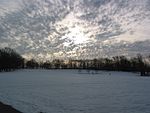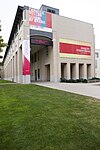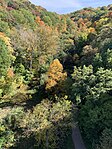Westinghouse Memorial

The Westinghouse Memorial is a bronze monument located in the U.S. city of Pittsburgh, Pennsylvania. It commemorates George Westinghouse, an engineer and inventor of the railway air brake. The memorial is located at the entrance to the Steven Faloon trail, a part of Schenley Park. The architects for the monument and the surrounding area were Henry Hornbostel and Eric Fisher Wood. Daniel Chester French was the sculptor for the statue and the main panel, and Paul Fjelde designed the side panels.The memorial consists of a statue of a schoolboy, who represents "The Spirit of the American Youth". He looks on at three panels that represent the life of George Westinghouse and is presumed to draw inspiration from them. The memorial is made of bronze and granite. It is one of many mementos to George Westinghouse in the area. Some additional honors include Westinghouse Park, George Westinghouse Memorial Bridge, and the George Westinghouse, Jr., Birthplace and Boyhood Home. The current location of the memorial is near the back of Carnegie Mellon University in the Squirrel Hill neighborhood of Pittsburgh. Schenley Drive, a road that runs through the park, is also nearby. In 2019, the memorial was designated a historic landmark by the city of Pittsburgh.
Excerpt from the Wikipedia article Westinghouse Memorial (License: CC BY-SA 3.0, Authors, Images).Westinghouse Memorial
Westinghouse Trail, Pittsburgh
Geographical coordinates (GPS) Address Nearby Places Show on map
Geographical coordinates (GPS)
| Latitude | Longitude |
|---|---|
| N 40.43946 ° | E -79.94271 ° |
Address
Westinghouse Trail
Westinghouse Trail
15213 Pittsburgh
Pennsylvania, United States
Open on Google Maps






